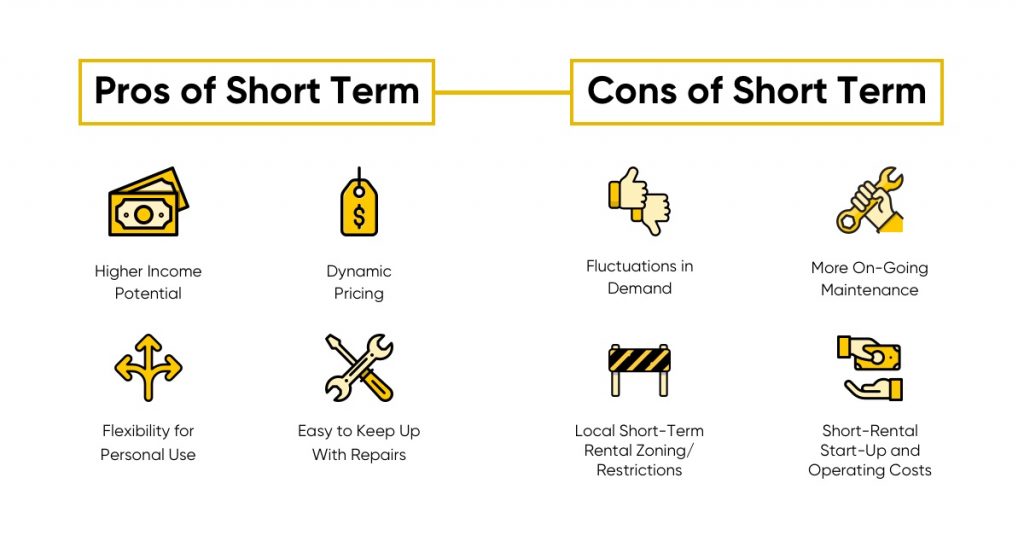![]() First time hosting? We have experts to help guide you, Click Here to find out more.
First time hosting? We have experts to help guide you, Click Here to find out more.
Airbnb vs Renting: 3 Easy Pros and Cons Before Starting

Airbnb vs Renting – What is it?
When it comes to Airbnb vs Renting, many factors can influence owners to choose long-term rental or short-term rental (Airbnb). Most of the time, this decision is simple and is based on the nature of your property and your goals. These two rental strategies, however, have several advantages and disadvantages.
What is Short-Term (Airbnb) Rentals?
A short term rental allows owners to rent out their property for vacation or commercial purposes for as little as a day or as long as a few months. This include listing your property in Airbnb, Booking.com, Agoda, etc.
According to The Star, short term rental platform or more specifically Airbnb is reporting its highest quarterly profits ever, confirming that the travel industry continues its pandemic recovery in the face of historic inflation.
Advantages of short-term rentals
While long-term rentals provide consistent income and are generally easier to manage, short-term rentals have several advantages to consider:
1. Higher Income Yield

Demand for short-term rental are consistent. Guest with larger pax prefer to have an entire house for themselves vs having to book several rooms in hotel. Demand especially goes up based on strategic location, theme of decoration, amenities & facilities. Owner also able to set the rate depending on demand and time of the year in order to maximize rental income.
2. Fewer Property Damage
Routine maintenance and ability to check the property on each guest interval allows for a better upkeep as host will be able to address any issue promptly to avoid extended damage over time. The fact that short-term rental homes are not occupied all year also contributes to less wear and tear.
3. Flexibility
Short-term rental allows owner the ability to block calendar off for whatever the reason; without having to inconvenient or hassle of notifying tenant. This flexibility benefits real estate investors who buy vacation homes for business, personal or family purposes with the goal of renting them out when they’re not in use.
Mostly it gives you the flexibility to enjoy the home for yourselves at moment notice.
Challenges of short-term rentals
1. Maintenance & Upkeep
When it comes to short-term rentals, you must keep the property in good condition or risk receiving negative feedback. This includes regular check on the property, fixing and repair that may arise during guest stay.
2. No Guaranteed Income
Many short-term rental owners are frustrated by the impact of seasonality of their business. While peak season is fully filled, off-peak bookings are sparse, causing owner to lose money. While pricing can be adjusted to compensate during off season, income and bookings are not always guaranteed.
3. The Hassle

While vacation rentals are a retirement passion turned vocation for some owners, they are a full-time job for others. There are lots of tasks to keep you busy during each guest’s visit. From ensuring calendar availability is correct to allow a seamless booking process, to a quick and easy check-in and check-out process, not to mention cleaners, gardeners, and the rest – vacation rentals may be difficult to manage if you don’t have the necessary patient and tools.
This however can be easily mitigated by hiring homestay operators. Not only will they handle A-Z (hassle-free service), depending on their expertise, owner can expect a better occupancy rate.

How much can I make on Airbnb?
A simple way to calculate your Airbnb revenue is by multiplying the year-round occupancy rate and your average daily rate. If you charge RM150/night and achieve a 70% occupancy rate, you will make around RM150*0.70*365, which is RM38,325 before expenses.
For a better & accurate estimation, you may reach out to CohostGURU for free consultation.
What is Long Term Rentals?
Long term rentals are typically for 12 months. In exchange for guaranteed occupancy, owner will lose out on profit that short-term brings.
Advantages of long-term rentals
There are certain advantages of choosing long-term strategy; here are a few of the major advantages:

1. Consistent Income
One of the primary benefits of renting your property on a long-term basis is having a reliable monthly rental income. This can help relieve stress for new homeowners who have a lot of other expenses to consider.
2. Easier to Manage
Long-term rentals usually only require the owner’s involvement when a major issue occurs. Other minor issues, such as upkeep of the unit, fall on the tenant.
3. No Furnishing Required
Some long-term guests bring their furniture. If you’re thinking about leasing your unfurnished property, this can make the decision easier. Not only will you have a guaranteed monthly rent payment, but you will also not have to spend money on new furniture for your home.
Disadvantages of long-term rentals
Some of the downside to be aware of are lower earning potential and tenant from hell. The disadvantages include:
Reduced Earning Potential
A long-term rental implies that the property is inaccessible for your personal use. Worse, if you’re in financial trouble, you can’t just decide to sell the property.
Less Control Over the Property
During the majority of rental stays, nothing goes wrong. When it comes to checking on your property, there is a significant difference between the short-term and long-term options.
Owners of short-term rentals benefit from the ability to inspect the property between guests to ensure that everything is in working order and that nothing is broken or damaged. Long-term rentals, on the other hand, are a little more complicated. Before dropping by for routine maintenance and security checks, you would most likely need to give plenty of notice (from 24 hours to one week).
Getting the Right Tenant
The real estate market is volatile, making it difficult to find a tenant willing to accept your price and terms.
In such cases, owners are frequently forced to reduce the rent just to keep their property from sitting vacant.
Most owners would agree that they would rather have the property vacant than give it up to a bad tenant and have to deal with all the problems.

Which would be your best option?
There is no perfect answer for everyone because what appears to be an advantage to you may be disadvantageous to others.
However, the main difference between long and short-term rentals is earning potential. Furthermore, according to The Telegraph, short-term rentals can generate up to 3 times the profit a traditional renting can bring. This is possible due to accessibility, location, seasonal and price optimization of the property.
There is no clear winner when it comes to Airbnb vs. long term renting but Airbnb does generate higher rental income. Though, this does come at a cost. Hosts need to ensure that their investment property boasts a great amenities, which might mean more upfront costs.
The hassle begins when all of the services required to keep Airbnb running pile up and eventually taking its toll on host. Therefore, opting for Homestay operator would lift this responsibility off their shoulder and at the same time owner would still enjoy all the benefit short-term rental provide.



